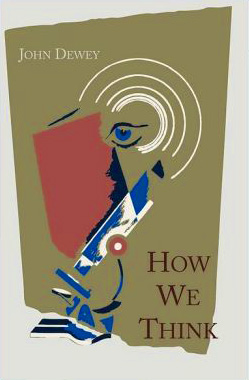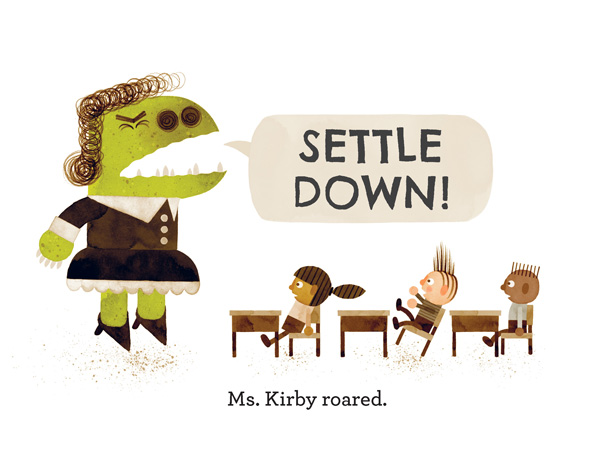John Dewey on the True Purpose of Education and How to Harness the Power of Our Natural Curiosity
by Maria Popova
“While it is not the business of education … to teach every possible item of information, it is its business to cultivate deep-seated and effective habits of discriminating tested beliefs from mere assertions, guesses, and opinions.”
“Do not feel absolutely certain of anything,”philosopher Bertrand Russell instructed in the first of his ten timeless commandments of teaching and learning in 1951. And yet formal education, today as much as then, is for the most part a toxic byproduct of industrialismbased on the blind acquisition of certainty and the demolition of the “thoroughly conscious ignorance” that gives rise to real progress, both personal and cultural. To fuel the internal engine of learning is a lifelong journey we are left to steer on our own as the education system continues to flounder. The quest to repair that broken system has never been addressed with more urgency and passion than it is today, and yet one of the most intelligent and timely takes on it comes from more than a century ago.
In How We Think (free download; public library) — his timelessly stimulating 1910 treatise on the art of reflection and fruitful curiosity — John Dewey, one of the most influential minds of the twentieth century, distills the purpose and ideals of education with remarkable clarity and conviction. The enactment of these ideals today would produce nothing less than a radical, sorely needed transformation of our broken education system.

Dewey champions the role of education in equipping us with the sort of critical thinking necessary for questioning authority, deconditioning our “mental bad habits,” and dispelling false beliefs and illusory ideas bequeathed to us by society:
Causes of bad mental habits are social as well as inborn… Over and above the sources of misbelief that reside in the natural tendencies of the individual (like those toward hasty and too far-reaching conclusions), social conditions tend to instigate and confirm wrong habits of thinking by authority, by conscious instruction, and by the even more insidious half-conscious influences of language, imitation, sympathy, and suggestion. Education has accordingly not only to safeguard an individual against the besetting erroneous tendencies of his own mind—its rashness, presumption, and preference of what chimes with self-interest to objective evidence — but also to undermine and destroy the accumulated and self-perpetuating prejudices of long ages. When social life in general has become more reasonable, more imbued with rational conviction, and less moved by stiff authority and blind passion, educational agencies may be more positive and constructive than at present, for they will work in harmony with the educative influence exercised willy-nilly by other social surroundings upon an individual’s habits of thought and belief.

While it is not the business of education to prove every statement made, any more than to teach every possible item of information, it is its business to cultivate deep-seated and effective habits of discriminating tested beliefs from mere assertions, guesses, and opinions; to develop a lively, sincere, and open-minded preference for conclusions that are properly grounded, and to ingrain into the individual’s working habits methods of inquiry and reasoning appropriate to the various problems that present themselves. No matter how much an individual knows as a matter of hearsay and information, if he has not attitudes and habits of this sort, he is not intellectually educated. He lacks the rudiments of mental discipline. And since these habits are not a gift of nature (no matter how strong the aptitude for acquiring them); since, moreover, the casual circumstances of the natural and social environment are not enough to compel their acquisition, the main office of education is to supply conditions that make for their cultivation. The formation of these habits is the Training of Mind.
And yet this training, Dewey is careful to point out, isn’t a one-size-fits-all operation but, rather, should be tailored to finding each student’s element and harnessing his or her natural ability:
The very importance of thought for life makes necessary its control by education because of its natural tendency to go astray, and because social influences exist that tend to form habits of thought leading to inadequate and erroneous beliefs. Training must, however, be itself based upon the natural tendencies — that is, it must find its point of departure in them. A being who could not think without training could never be trained to think; one may have to learn to thinkwellthink. Training, in short, must fall back upon the prior and independent existence of natural powers; it is concerned with their proper direction, not with creating them.

Alan: Most "educated" people confuse education with instruction. "Education" - deriving from the Latin "ex ducare" - "leads out of" preemptive concern with individual good to re-focus attention on The Common Good. In a word, "education" is social. On the other hand, "instruction" - from the Latin "in struire" -- builds facts and skill-sets "into" atomistic individuals, enabling them to make their own way in private worlds. "Instruction" is essentially monadic and isolating. Without education, instruction (the planet's default learning method) undermines The Common Good, teaching people to treat the world as a money mine to be exploited like 49-ers staking claims to private land tracts used for personal advantage. The goals charted by education and instruction are essentially antipodal although the latter can -- and should -- be used in service to the former.
Dewey makes an enormously important point — one that Adrienne Rich would come to echo decades later in her brilliant commencement address on why an education is something you claim, not something you get — arguing that “the one taught must take the initiative”:
Teaching and learning are correlative or corresponding processes, as much so as selling and buying. One might as well say he has sold when no one has bought, as to say that he has taught when no one has learned. And in the educational transaction, the initiative lies with the learner even more than in commerce it lies with the buyer. If an individual can learn to think only in the sense of learning to employ more economically and effectively powers he already possesses, even more truly one can teach others to think only in the sense of appealing to and fostering powers already active in them. Effective appeal of this kind is impossible unless the teacher has an insight into existing habits and tendencies, the natural resources with which he has to ally himself.
Two of our most important and most universal natural faculties essential for learning are curiosity and a “desire for fullness of experience.” Dewey writes:
The curious mind is constantly alert and exploring, seeking material for thought, as a vigorous and healthy body is on the qui vive for nutriment. Eagerness for experience, for new and varied contacts, is found where wonder is found. Such curiosity is the only sure guarantee of the acquisition of the primary facts upon which inference must base itself.
He later adds:
To the open mind, nature and social experience are full of varied and subtle challenges to look further.

Matthew Chapter 6
Do Not Worry
25 “Therefore I tell you, do not worry about your life, what you will eat or drink; or about your body, what you will wear. Is not life more than food, and the body more than clothes? 26 Look at the birds of the air; they do not sow or reap or store away in barns, and yet your heavenly Father feeds them. Are you not much more valuable than they?27 Can any one of you by worrying add a single hour to your life?
28 “And why do you worry about clothes? See how the flowers of the field grow. They do not labor or spin. 29 Yet I tell you that not even Solomon in all his splendor was dressed like one of these. 30 If that is how God clothes the grass of the field, which is here today and tomorrow is thrown into the fire, will he not much more clothe you—you of little faith? 31 So do not worry, saying, ‘What shall we eat?’ or ‘What shall we drink?’ or ‘What shall we wear?’ 32 For the pagans run after all these things, and your heavenly Father knows that you need them. 33 But seek first his kingdom and his righteousness, and all these things will be given to you as well. 34 Therefore do not worry about tomorrow, for tomorrow will worry about itself. Each day has enough trouble of its own."
Our ability to cultivate the powers of curiosity and reap its fruits, however, is predicated on our fragile willingness to embrace uncertainty and welcome the unknown. Lamenting “the open-minded and flexible wonder of childhood and of the ease with which this endowment is lost,” Dewey considers the various channels of this loss and how education, at its best, can rekindle curiosity:
If germinating powers are not used and cultivated at the right moment, they tend to be transitory, to die out, or to wane in intensity. This general law is peculiarly true of sensitiveness to what is uncertain and questionable; in a few people, intellectual curiosity is so insatiable that nothing will discourage it, but in most its edge is easily dulled and blunted.[...]Some lose it in indifference or carelessness; others in a frivolous flippancy; many escape these evils only to become incased in a hard dogmatism which is equally fatal to the spirit of wonder. Some are so taken up with routine as to be inaccessible to new facts and problems. Others retain curiosity only with reference to what concerns their personal advantage in their chosen career. With many, curiosity is arrested on the plane of interest in local gossip and in the fortunes of their neighbors; indeed, so usual is this result that very often the first association with the word curiosity is a prying inquisitiveness into other people’s business. With respect then to curiosity, the teacher has usually more to learn than to teach. Rarely can he aspire to the office of kindling or even increasing it. His task is rather to keep alive the sacred spark of wonder and to fan the flame that already glows. His problem is to protect the spirit of inquiry, to keep it from becoming blasé from overexcitement, wooden from routine, fossilized through dogmatic instruction, or dissipated by random exercise upon trivial things.

Pupils who in matters of ordinary practical experience have a ready and acute perception of the difference between the significant and the meaningless, often reach in school subjects a point where all things seem equally important or equally unimportant; where one thing is just as likely to be true as another, and where intellectual effort is expended not in discriminating between things, but in trying to make verbal connections among words.[...]The depth to which a sense of the problem, of the difficulty, sinks, determines the quality of the thinking that follows; and any habit of teaching which encourages the pupil for the sake of a successful recitation or of a display of memorized information to glide over the thin ice of genuine problems reverses the true method of mind training.
In the remainder of How We Think, an immeasurably lucid and necessary read in its entirety, Dewey goes on to explore the most reliable strategies for cultivating the essential “mental discipline” of intellectual development and self-expansion, both in public formal education and in our private journeys of lifelong learning. Download it as a free ebook here, then revisit Kio Stark’s modern manifesto for lifelong learning beyond the classroom.



No comments:
Post a Comment